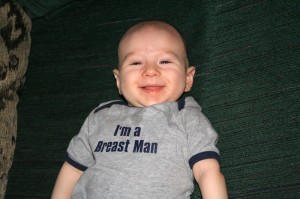(This piece appears in the recently published Anthology of Disability Literature)
Recently, my 12-year-old Alex kept trying to scoot through an open door in the basement of our neighborhood supermarket. The store wasn’t crowded and hardly anyone noticed me hauling him back to the checkout line except a young lady working the register. I saw her looking at Alex with the small smile and direct eyes that I’ve learned mean: She knows someone with autism. She stroked his head once.
The cashier might have stroked Alex’s head out of understanding the kind of life Alex is likely to have. Of course I wish she’d felt comfortable yelling at him, comfortable because he was normal and he shouldn’t be trying to run in the basement of a grocery store, comfortable in the way somebody might be yelling at Alex’s typically developing 9-year-old brother Ned.
They don’t yell at Alex in the pizza place, either. I take him there in the fragile hope that he’ll eat the cheese off a slice or two while he’s out of the house so Ned can get his English tutoring. Alex and I often take the table way in the back, and the first few times I did this I was scared he would bolt while I got the pizza. “We’ll keep an eye on him, buddy,” the guy behind the counter said.
Alex has received his share of looks – more outside of New York City (they positively stared in the Massachusetts malls), perhaps because people are used to seeing just about anything in New York and passing by without what appears to be an obvious thought. When Alex was still a baby on oxygen, some kids on a Queens sidewalk did ask, “What happened to that guy!?” That was nice; Alex was emerging from a year in the hospital, and it was good to think he’d ceased to be patient and had finally become some “guy” on a sidewalk.
People – at least the people I’d like to have around Alex – seem to need to think there’s something beyond vulnerability to those with autism. Something special or beneficial to society, or at least likable and warm, like the message of movies like Rain Man, lessons tied up in what Richard Yates disdainfully called “a neat little dramatic package.” Yeah, there’s autism. But they can count cards, too! Some of them can count cards. Some can paint. Some with autism can do all sorts of things, just like some of all of us can, and of course the verdict is still a long way off when it comes to Alex’s real abilities. I want people to stroke his head someday because he helped them, because he contributed in a way that brought him fulfillment at the end of his working day. And I want to live to see him get that. I call that my Hopeful Outlook.
–Jeff Stimpson
Alex: The Fathering of a Preemie and Alex the Boy: Episodes From a Family’s Life With Autism













